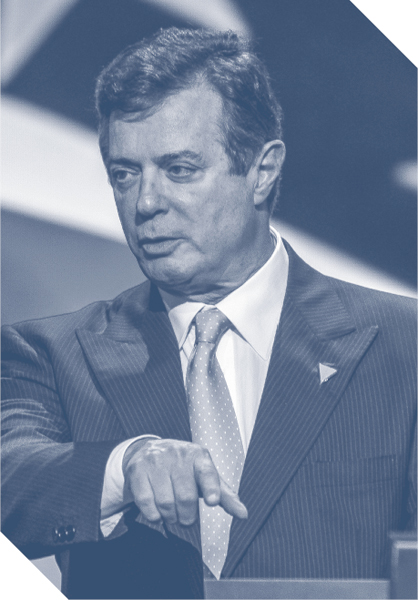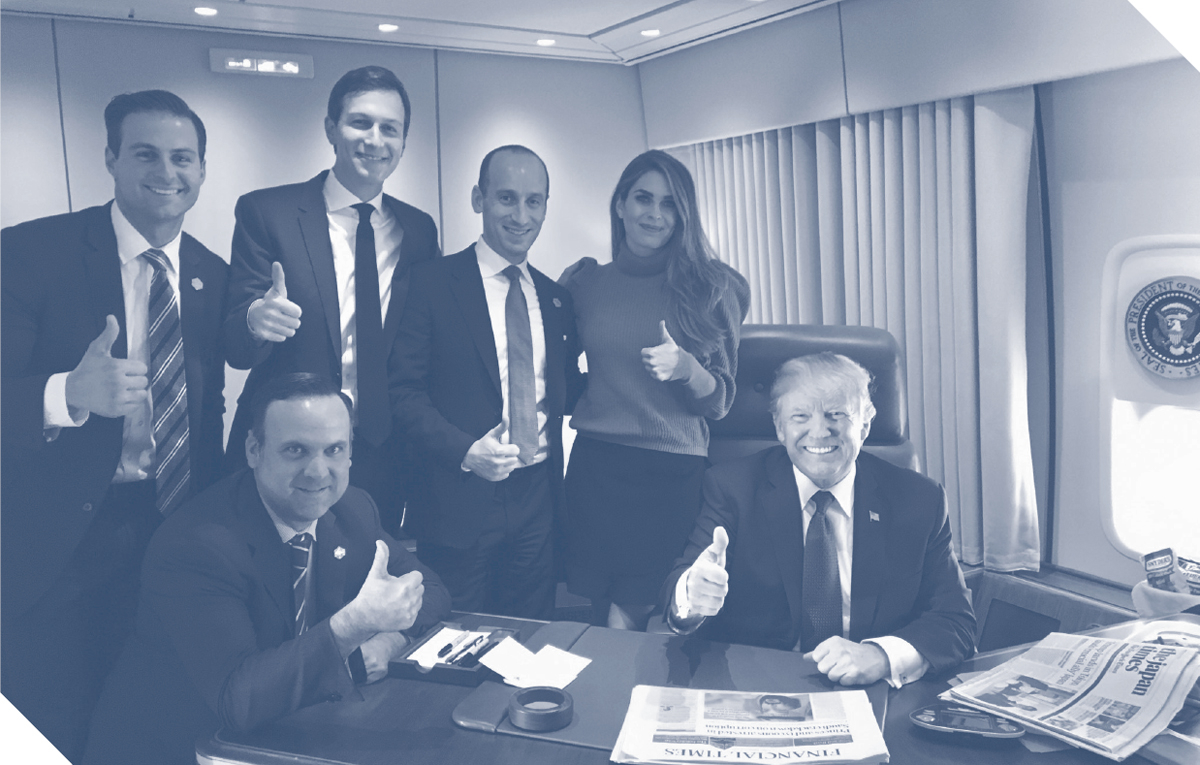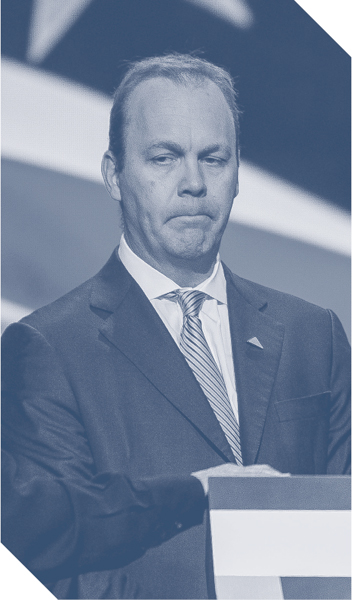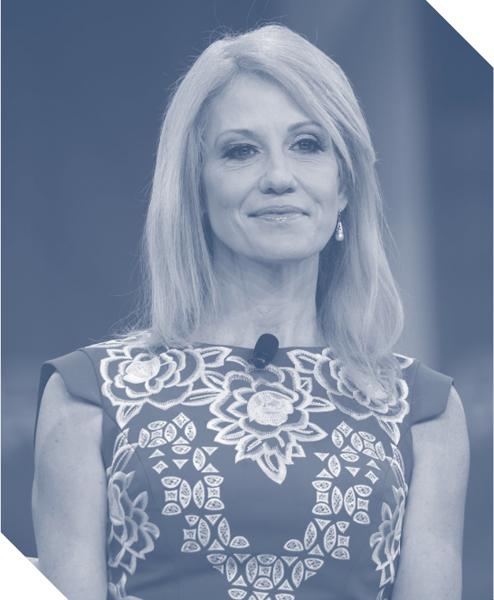
Donald Trump ran an unorthodox presidential campaign in many respects. In addition to high turnover, especially in the last few months of the campaign, the campaign was relatively low budget. It also did not pay several key staffers, an unusual arrangement. Trump had 130 people on his payroll by the end of August 2016, far fewer than Clinton’s 800 paid staffers.
KEY CAMPAIGN STAFF
Paul Manafort

(Shutterstock)
Campaign chairman and chief strategist starting May 19, 2016. Was convention manager starting March 29, 2016. Resigned August 19, 2016.
Manafort was a veteran campaign strategist and consultant for American candidates, foreign candidates and governments, and corporations. He also is alleged to have worked as an unregistered lobbyist for Ukraine. Manafort was not paid by the Trump campaign. He was charged with thirty-two counts of financial crimes, including falsified income tax returns, failure to file foreign bank and financial accounts, bank fraud conspiracy, and bank fraud. Initially released on bail, he was sent to jail while he awaited trial because he allegedly tried to get witnesses to lie on his behalf.

Former football star, Fox production assistant, and Trump “body man” John McEntee, with Dan Scavino, Jared Kushner, Stephen Miller, Hope Hicks, and Donald Trump aboard Air Force One. (White House/Wikimedia Commons)
Rick Gates

(Shutterstock)
Deputy campaign manager, May 2016. Deputy chair of Trump inauguration committee.
Gates, a lobbyist, political consultant, and long time associate of Paul Manafort’s, joined the Trump campaign as its second-in-command in spring 2016. Gates was not paid for his work on the Trump campaign but made $100,000 for his work on the inauguration. In February 2018 Gates pleaded guilty to conspiracy and lying to the FBI, and he agreed to provide information to the special counsel’s investigation into Russia’s interference in the 2016 election.
Stephen K. Bannon
Campaign chief starting August 17, 2016. Trump’s chief strategist until August 2017.
Bannon was the chairman of Breitbart News Network, a website that specializes in news and commentary from the far right end of the political spectrum. Bannon worked for Goldman Sachs, was a producer in Hollywood, and was an officer in the United States Navy.
Kellyanne Conway

(Gage Skidmore)
Joined Trump campaign as senior adviser on July 1, 2016, and became campaign chair on August 19, 2016, when Manafort resigned. A pollster and strategist, she worked for a political action committee that supported Trump’s rival Ted Cruz. The campaign did not pay her, but Trump’s political action committee did. She is the first woman to run a presidential campaign. In the Trump White House, she is counselor to the president.
Hope Hicks
Communications director for the Trump campaign starting in January 2015. Left White House in 2018.
One of Trump’s most trusted aides, Hicks is a former model who worked for Ivanka Trump and then briefly for the Trump Organization before she joined the campaign in its early stages. She remained one of Trump’s most trusted aides until she left the White House in February 2018.
Corey Lewandowski
Campaign manager, June 2015–June 2016.
A lobbyist and conservative strategist and unsuccessful state congressional candidate himself, Lewandowski’s campaign motto for the Trump campaign was “Let Trump Be Trump.” He was charged with battering a reporter at a campaign event; those charges were later dropped.
Roger Stone
Adviser, left campaign in August 2015, but continued to provide Trump support afterward.
A lobbyist and longtime Trump confidant, Stone is described as a dirty trickster and master of the political dark arts and is a self-professed GOP hitman. He has a tattoo of Richard Nixon on his back and worked for the Committee to Re-Elect the President, which he called CREEP. His political rules are “admit nothing, deny everything, launch counterattack.” He reportedly sought dirt on Clinton from Russian sources but balked at the $2 million price tag.
Sam Nunberg
Political consultant for Trump, on and off, starting in 2014.
Nunberg, a protégé of Roger Stone, helped Trump with communications. He had a history of posting controversial things on social media, including racial slurs. Trump once left Nunberg in a McDonald’s after his special-order burger was taking too long. After Nunberg left the Trump campaign he endorsed Trump’s rival Ted Cruz.
Michael Glassner
National political director hired in July 2015, later served as deputy campaign manager.
Glassner was an adviser to John McCain’s former vice-presidential candidate Sarah Palin. He was in charge of the campaign’s strategic planning operations. He is now the chief operating officer of Trump’s reelection campaign.
Roger Ailes
Debate adviser, August 2016.
Ailes was the chairman of Fox News but lost his job following allegations of sexual harassment. He advised Trump on debate strategy, though the campaign insisted the disgraced media mogul and experienced debate adviser had no role in preparing Trump.
David Bossie
Deputy campaign manager, August 2016, and deputy executive director for Trump presidential transition team.
Bossie is president of Citizens United, a political action committee that sued the Federal Elections Commission and won a Supreme Court decision that protects the act of speech of corporations and unions as though they were individual citizens.
Sam Clovis
Policy adviser, August 2015, eventually becoming national co-chair of Trump’s election campaign.
A former Air Force fighter pilot, he became a college professor, talk show host, and birther conspiracy theorist. He selected George Papadopoulos for the Trump campaign.
Brad Parscale
Started work building websites with the Trump organization in 2011. Was digital director during 2016 election campaign. Appointed campaign manager of 2020 reelection campaign.
Parscale’s company, Giles-Parscale, received $94 million from the Trump campaign, which was used to take out online ads and pay subcontractors for Trump’s online presence. Parscale headed digital strategy, and also oversaw data collection, fundraising, and advertising.
KEY CAMPAIGN POLICY ADVISERS
Stephen Miller
Senior policy adviser beginning in January 2016, national policy director for the Trump transition team, and then senior White House adviser for policy. A former communications director for then-Senator Jeff Sessions of Alabama, Miller helped write Trump’s inaugural address, drafted the original White House ban on Muslim immigrants, and also endorsed a zero-tolerance approach to preventing undocumented border crossings, which included separating infants and children from their parents.
George Papadopoulos
Joined the Trump campaign as foreign policy consultant in March 2016.
Selected by Sam Clovis to join the Trump campaign, Papadopoulos had briefly worked for Ben Carson’s presidential campaign. Trump identified Papadopoulos as an “energy and oil consultant, excellent guy.” Papadopoulos repeatedly attempted to make connections between the Trump campaign and the Russian government, and on October 5, 2017, pleaded guilty to making “material false statements and material omissions” to the FBI about contacts he’d had with Russian government officials.
Carter Page
Foreign policy adviser, announced as a member of Trump’s campaign team in March 2016.
He’d been of interest to the FBI since 2013, when he was caught on a wiretap talking with suspected Russian spies who were trying to recruit him. Page also described himself in a letter as “an informal adviser to the staff of the Kremlin.” He has denied being a Russian agent.
TRUMP FAMILY INVOLVED IN CAMPAIGN
Jared Kushner
Ivanka Trump’s husband since 2009, Kushner is an heir to a real estate empire who joined the campaign initially to help research tax and trade policy positions. But he assumed more control and influence over the campaign, focusing eventually on data and digital marketing. In the White House, he is a senior adviser to Trump.
Ivanka Trump
Introduced Trump at June 2015 launch of his campaign. Advised his campaign on issues relating to women.
She stepped down from her role as executive vice president in the Trump Organization in early 2017 earning $3.9 million that year from her share in Trump International Hotel in DC, and an additional $2 million in severance. She works as an unpaid senior adviser in the Trump White House.
Don Trump Jr.
On June 3, 2016, Trump’s oldest son was sent an e-mail offering “official documents and information that would incriminate Hillary and her dealings with Russia and would be very useful to your father.” He accepted the meeting and was disappointed not to receive useful information. He later testified before the Senate Judiciary Committee about the meeting and provided a misleading description of the meeting to journalists, a description Trump himself dictated while on board Air Force One.